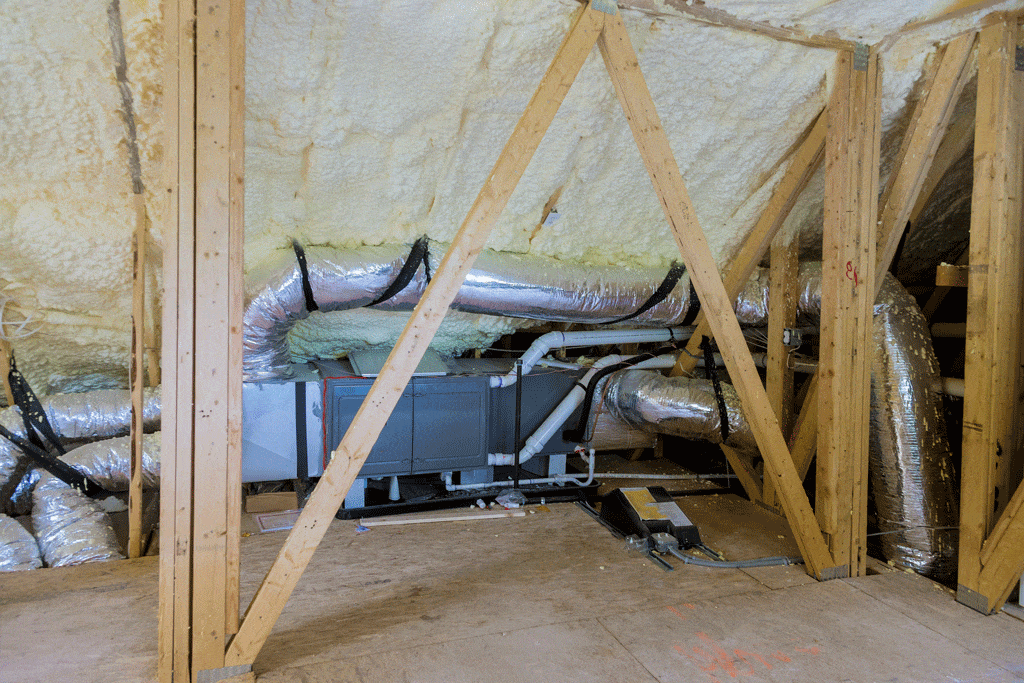Residential HVAC Installation: Essential Tips for Homeowners

Have you ever wondered how to navigate the complexities of installing a residential HVAC system?
As a homeowner, understanding the nuances of residential HVAC installation can be daunting, but it’s crucial for ensuring a comfortable and efficient home. Whether you’re in Phoenix, Scottsdale, or any other location, this guide is tailored to your needs.
In this article, we delve into the world of residential HVAC installation, offering you practical tips and insights.
From selecting the right system to understanding the installation process, we cover everything you need to know. Our goal is to empower you with knowledge, making your HVAC installation journey as effortless as possible.
What are Tips for Residential HVAC Installation?
Residential HVAC installation refers to the process of setting up a heating, ventilation, and air conditioning (HVAC) system in a home. This type of installation is crucial for maintaining a comfortable indoor environment throughout the year, regardless of the external weather conditions.
The process typically involves several key steps, each of which plays a vital role in ensuring the efficient and effective operation of the HVAC system.
Firstly, the selection of the HVAC system is an essential step. Homeowners must choose a system that suits their specific needs, considering factors like the size of the home, climate, and energy efficiency.
Different types of systems are available, including central air conditioners, heat pumps, and furnaces. Each type has its own set of advantages and is suitable for different climates and home sizes.
The next step in residential HVAC installation is the design and planning phase. This involves determining the optimal layout for ductwork, vents, and the HVAC unit itself.
Professional HVAC installers typically perform a detailed analysis of the home’s layout to ensure proper air distribution and energy efficiency. They also consider factors like the home’s insulation and air sealing to optimize the system’s performance.
Installation is the most critical phase. This involves the physical installation of the HVAC unit, ductwork, and other components.
Professional technicians ensure that the system is installed correctly, adhering to safety standards and local building codes. Proper installation is key to the system’s longevity and efficiency.
Finally, the testing and commissioning phase ensures that the newly installed HVAC system operates correctly.
Technicians will test the system for proper airflow, thermostat operation, and overall efficiency. This step is crucial to identify and rectify any issues before the system is put into regular use.
Residential HVAC installation is a comprehensive process that requires careful consideration, planning, and professional execution.
It’s an investment in home comfort and energy efficiency, ensuring that households can enjoy a comfortable indoor environment all year round.
Understanding HVAC Systems
The Basics of Residential HVAC installation
Before embarking on the journey of residential HVAC installation, it’s essential to grasp the basics of what an HVAC system entails. HVAC, an acronym for Heating, Ventilation, and Air Conditioning, is more than just a mechanism to keep your home warm in winter and cool in summer.
It’s a comprehensive system designed to offer comfort and maintain a consistent indoor climate, ensuring the air quality in your home is healthy and comfortable.
Components of an HVAC System
An HVAC system comprises several key components, each playing a vital role in its overall functionality:
Heating Unit: This is typically a furnace or a boiler that generates heat, often powered by natural gas, oil, electricity, or solar energy.
Cooling Unit: Usually an air conditioner, this component removes heat from your home, transferring it outside to cool the indoor space.
Ventilation System: This includes ductwork and vents that circulate air throughout your home, ensuring even distribution of heated or cooled air.
Thermostat: The control center of the HVAC system, a thermostat, allows you to set and regulate the temperature according to your comfort levels.
How HVAC Systems Work
The operation of an HVAC system is a coordinated process:
In heating mode, the heating unit generates warmth, which is then distributed throughout the home via the ventilation system.
In cooling mode, the air conditioner extracts heat from indoor air, expels it outside, and circulates the cooled air back into the house.
The ventilation system plays a crucial role in maintaining air quality, removing contaminants and ensuring a steady exchange of indoor and outdoor air.
Importance of Proper Sizing and Selection
One of the most critical aspects of tips for residential HVAC installation is choosing the right size and type of system for your home.
An oversized or undersized HVAC system can lead to inefficiency, increased energy costs, and uneven temperature regulation.
Factors like the size of your home, insulation levels, window placement, and local climate must be considered to select an appropriate system.
Energy Efficiency and Modern Innovations
Modern HVAC systems come with various energy-efficient features and innovations.
Look for systems with high SEER (Seasonal Energy Efficiency Ratio) ratings for air conditioners and high AFUE (Annual Fuel Utilization Efficiency) ratings for heating systems. These features not only contribute to environmental sustainability but also reduce your energy bills significantly.
Understanding these fundamentals of HVAC systems is the first step towards a successful installation.
With this knowledge, you’re better equipped to make informed decisions about your home’s heating, ventilation, and air conditioning needs.
Choosing the Right HVAC System
Selecting the right HVAC system is a pivotal decision for any homeowner, and understanding the nuances involved can make a significant difference in both comfort and cost-efficiency.
This process involves several key factors, each playing a crucial role in ensuring that you make the most informed decision possible.
Assessing Home Size and Layout
The size and layout of your home are fundamental in determining the capacity and type of HVAC system required.
A system that’s too large will cycle on and off frequently, leading to inefficient energy use and increased wear and tear. Conversely, a system that’s too small will struggle to maintain a comfortable temperature, leading to inefficiency and overuse.
It’s essential to calculate the square footage of your living space and consider the layout – including ceiling heights and window placements – to choose a system that’s just right for your home.
Climate Considerations
The climate in your area plays a significant role in selecting an HVAC system. If you live in a region with extreme temperatures, either hot or cold, you’ll need a system that can handle these demands efficiently.
For instance, in hotter climates, a system with a higher Seasonal Energy Efficiency Ratio (SEER) rating is preferable for its ability to cool more effectively.
Energy Efficiency and Cost Savings
Energy efficiency is another critical factor in choosing the right HVAC system.
Systems with higher efficiency ratings may cost more upfront but can lead to significant savings on your energy bills in the long run. Look for systems with Energy Star ratings, as these are certified to be more efficient than standard models.
Additionally, consider the long-term savings you could achieve with a more efficient system, as this can offset the initial investment over time.
Professional Consultation
Consulting with a professional residential HVAC installation technician can provide valuable insights into the best system for your home. These experts can assess your home’s specific needs, taking into account factors like size, layout, and local climate.
They can also advise on the latest technology and models, ensuring you get a system that’s not only efficient but also equipped with modern features for enhanced comfort and control.
Choosing the right residential HVAC installation service involves careful consideration of your home’s size and layout, local climate, energy efficiency, and professional advice.
By taking these factors into account, you can ensure that residential HVAC installation leads to a comfortable, efficient, and cost-effective solution for your home.
Photo By LookerStudio at Shutterstock
Understanding Installation Costs
When planning for a residential HVAC installation, it’s crucial to have a comprehensive understanding of all the costs involved. This knowledge ensures that you can budget effectively and avoid any unexpected expenses.
The costs associated with residential HVAC installation are not limited to the purchase price of the unit; they also include installation fees, potential home modifications, and future maintenance expenses.
Initial Purchase Price
The initial purchase price of an HVAC system can vary widely based on the type, brand, and capacity of the unit.
Generally, higher-capacity and more energy-efficient models tend to be more expensive. It’s important to balance your immediate budget with your long-term savings potential.
Investing in a more efficient system might cost more upfront but can save you money in the long run through reduced energy bills.
Installation Fees
Installation fees are a significant part of the overall cost and can vary depending on the complexity of the installation.
Factors that influence installation costs include the type of HVAC system you choose, the ease of access to the residential HVAC installation site, and the need for any additional ductwork or electrical upgrades.
It’s advisable to get quotes from several contractors to understand the market rate and ensure you’re getting a fair price.
Home Modifications
Sometimes, installing a new HVAC system may require modifications to your home. This could include upgrading electrical systems, installing new ductwork, or making structural changes to accommodate the new unit.
These modifications can add to the overall cost of installation. It’s important to discuss these potential needs with your installer beforehand so you can budget accordingly.
Future Maintenance Costs
Considering the future maintenance costs of your HVAC system is also essential.
Regular maintenance is crucial for keeping your system running efficiently and prolonging its lifespan. This includes routine inspections, filter changes, and occasional repairs. While these costs can add up over time, they are vital for ensuring your system remains effective and efficient.
Understanding the full spectrum of costs associated with tips for residential HVAC installation is key to making an informed decision.
This includes not only the initial purchase price but also installation fees, potential home modifications, and future maintenance expenses.
By considering all these factors, you can ensure that your investment in an HVAC system is well-planned and cost-effective, providing comfort and efficiency in your home for years to come.
Preparing Your Home for Installation
When it comes to tips for residential HVAC installation, preparing your home for the installation process is a crucial step that can significantly impact the efficiency and success of the project.
Proper preparation not only facilitates a smoother residential HVAC installation process but also helps in ensuring the safety and efficiency of the work being done.
Here are some key aspects to consider when preparing your home for an HVAC installation.
Clearing the Installation Area
The first step in preparing your home is to clear the area where the HVAC system will be installed. This involves removing any furniture, decorations, or other obstacles that could hinder access to the installation site.
If the HVAC system is being installed in a basement or attic, make sure the pathways leading to these areas are clear.
This not only provides the residential HVAC installation technicians with unobstructed access but also helps protect your belongings from accidental damage.
Ensuring Easy Access for Technicians
Providing easy access for the residential HVAC installation technicians is essential. This includes ensuring that all doors or gates that lead to the installation area are unlocked and open.
If there are any pets in the home, they should be secured in a separate area to ensure both their safety and the safety of the installation crew.
Additionally, if the installation requires access to the attic or crawl spaces, make sure these areas are easily accessible and free from clutter.
Preparing the Outdoor Unit Location
If your HVAC system includes an outdoor unit, it’s important to prepare the location where it will be placed.
This might involve clearing any debris, trimming back foliage, or even leveling the ground. The outdoor unit requires adequate clearance for airflow, so ensuring that the area around it is clear and unobstructed is crucial for the system’s efficiency.
Communicating with the Installation Team
Effective communication with your HVAC installation team is key. Discuss any specific requirements or concerns you may have before the installation day.
This could include questions about the residential HVAC installation process, the duration of the work, or any preparations that need to be made in advance.
Clear communication can help prevent misunderstandings and ensure that the installation process goes smoothly.
Preparing your home for an HVAC installation is an important aspect of tips for residential HVAC installation.
It involves clearing the installation area, ensuring easy access for technicians, preparing the outdoor unit location, and maintaining clear communication with the installation team.
By taking these steps, you can help ensure a smooth and efficient installation process, setting the stage for your new HVAC system to function effectively and efficiently.
The Residential HVAC Installation Process
Understanding the installation process is a critical component of tips for residential HVAC installation.
Familiarizing yourself with what the process entails can help set realistic expectations and ensure a smooth transition. The residential HVAC installation process typically includes system placement, ductwork installation, and making the necessary electrical connections. Let’s break down these key stages:
System Placement
The placement of your HVAC system is a crucial first step in the residential HVAC installation process. This involves determining the most efficient and practical location for both the indoor and outdoor units.
The indoor unit, which often includes the furnace or air handler, should be placed in a location that allows for easy access for future maintenance and repairs.
The outdoor unit, typically the condenser, needs to be placed in an area with good airflow and away from obstructions like plants or structures. Proper placement is essential for optimal performance and efficiency of your HVAC system.
Ductwork Installation and Modification
Ductwork installation is another vital aspect of the HVAC installation process. If your home already has existing ductwork, the technicians will inspect it to ensure it’s in good condition and compatible with the new system.
Any necessary modifications or repairs to the ductwork will be made to improve efficiency and airflow.
In cases where new ductwork is required, the installation team will design and install a duct system that ensures efficient distribution of air throughout your home. Proper ductwork installation is crucial for maintaining consistent temperatures and improving overall comfort.
Electrical Connections and Safety Checks
The final step in the installation process involves making the necessary electrical connections and conducting safety checks.
This includes wiring the HVAC system to your home’s electrical system and ensuring all connections are secure and comply with local codes and regulations.
Safety checks are performed to ensure the system is functioning correctly and safely. This includes testing the thermostat, checking for gas leaks (in the case of gas furnaces), and ensuring the system cycles on and off properly.
Understanding the installation process is an integral part of tips for residential HVAC installation.
It involves careful system placement, meticulous ductwork installation or modification, and thorough electrical connections and safety checks. By being aware of these steps, you can better prepare for the installation day and ensure a seamless and efficient setup of your new HVAC system.
Photo By vinnstock at Shutterstock
Post-Installation Tips
After the installation of your HVAC system, understanding how to maintain it becomes crucial.
This is an essential part of tips for residential HVAC installation, as proper maintenance not only prolongs the life of your system but also ensures it runs efficiently and effectively. Let’s explore the key aspects of post-installation care for your HVAC system.
Regular Maintenance Schedule
Establishing a regular maintenance schedule is vital for the longevity and efficiency of your HVAC system. This typically involves annual check-ups by a professional technician who can inspect the system, clean essential components, and identify any potential issues before they become major problems.
Regular maintenance includes tasks such as replacing air filters, cleaning ducts, and checking refrigerant levels.
Adhering to a maintenance schedule can prevent unexpected breakdowns and ensure your system operates at peak efficiency.
Understanding Your HVAC System
Familiarizing yourself with the basics of your HVAC system is beneficial. This includes understanding how it operates, the function of each component, and the signs that indicate a need for maintenance or repair.
Knowing the basics can help you communicate more effectively with technicians and understand the recommendations they provide.
It also empowers you to perform simple maintenance tasks yourself, such as changing filters and cleaning around the outdoor unit.
Energy Efficiency Practices
Implementing energy efficiency practices can significantly reduce your energy bills and extend the life of your HVAC system.
This includes using programmable thermostats to control the temperature efficiently, ensuring your home is well-insulated to reduce heating and cooling demands, and using ceiling fans to assist in maintaining comfortable temperatures.
Energy-efficient practices not only save money but also contribute to the environmental sustainability of your home.
Monitoring System Performance
Regularly monitoring the performance of your HVAC system is important to ensure it is operating as expected.
Pay attention to how quickly your home reaches the desired temperature, any unusual noises, and the quality of indoor air. If you notice any changes in performance, it may be time to call a professional for a check-up.
Post-installation tips for your HVAC system are a critical aspect of tips for residential HVAC installation. These include establishing a regular maintenance schedule, understanding your system, implementing energy efficiency practices, and monitoring system performance.
By following these guidelines, you can ensure that your HVAC system remains in top condition, providing comfortable and efficient heating and cooling for your home.
Working with Professionals
When it comes to tips for residential HVAC installation, one of the most critical aspects is choosing the right professionals for the job.
The expertise and experience of the technicians you hire can significantly impact the efficiency, longevity, and safety of your HVAC system. Here’s a breakdown of what to consider when selecting HVAC professionals.
Verifying Credentials and Experience
The first step in choosing the right residential HVAC installation professionals is to verify their credentials and experience. Look for technicians who are licensed and certified in HVAC installation and repair.
Licensing ensures that they have met the industry standards and are up-to-date with the latest HVAC technologies and regulations. Additionally, consider their experience, especially with installations similar to yours. Experienced technicians are more likely to anticipate and efficiently solve any issues that may arise during the installation.
Assessing Reputation and Reviews
In today’s digital age, it’s easy to research the reputation of residential HVAC installation professionals. Look for customer reviews and testimonials, either on their website or third-party review sites.
Pay attention to comments about their professionalism, punctuality, quality of work, and how they handle any issues. A company with a solid reputation is likely to provide reliable and high-quality services.
Understanding Warranties and Service Agreements
A reputable residential HVAC installation company should offer warranties and service agreements. Warranties provide assurance on the quality of both the HVAC system and the installation work.
Service agreements, on the other hand, cover ongoing maintenance and repairs, ensuring your system remains in optimal condition.
Understanding the details of these warranties and service agreements is crucial, as they can save you significant costs and hassles in the long run.
After-Service Support
After-service support is an essential aspect of working with HVAC professionals. This includes their responsiveness to any queries or issues you might encounter after the installation.
A good residential HVAC installation company will offer prompt and helpful after-service support, providing peace of mind that you have ongoing assistance whenever needed.
Working with the right professionals is a key element of tips for residential HVAC installation. It involves verifying credentials and experience, assessing reputation and reviews, understanding warranties and service agreements, and ensuring reliable after-service support.
By carefully selecting qualified and reputable HVAC technicians, you can ensure a smooth installation process and enjoy a well-functioning HVAC system in your home.
Professional Installation vs. DIY
When it comes to tips for residential HVAC installation, homeowners often face the choice between professional installation and attempting a DIY approach.
While DIY projects can be appealing for smaller home tasks, the complexity and importance of an HVAC system typically call for professional expertise. Let’s explore the differences between professional installation and DIY in the context of HVAC systems.
The Risks of DIY HVAC Installation
DIY HVAC installation can be tempting, especially for those who enjoy home improvement projects or are looking to save on costs.
However, HVAC systems are complex and require a thorough understanding of electrical systems, ductwork, and refrigerant handling. Mistakes in residential HVAC installation can lead to inefficient system performance, increased energy costs, and even safety hazards like gas leaks or electrical fires.
Additionally, incorrect installation can void manufacturer warranties and lead to costly repairs down the line.
Benefits of Professional HVAC Installation
Professional HVAC technicians bring a wealth of experience and knowledge to the installation process. They are trained to handle various aspects of HVAC installation, including:
Technical Expertise: Professionals have the necessary training and tools to ensure that the HVAC system is installed correctly and operates at peak efficiency.
Safety Compliance: HVAC installation involves electrical work, handling of refrigerants, and sometimes gas connections. Professionals are knowledgeable about safety standards and local building codes, ensuring a safe installation.
Time and Cost Efficiency: Although hiring professionals involves upfront costs, their expertise can save time and prevent costly mistakes. They can also advise on the most energy-efficient systems, leading to long-term savings on energy bills.
Warranty and Reliability: Professional installations often come with warranties for both the equipment and the labor. This provides peace of mind and protection against future issues.
Making the Right Choice
For most homeowners, the benefits of professional HVAC installation outweigh the potential savings of a DIY approach.
The complexity of HVAC systems, combined with the importance of correct installation for safety, efficiency, and system longevity, makes professional installation the recommended choice.
When considering tips for residential HVAC installation, it’s crucial to weigh the risks and benefits and choose the option that ensures a safe, efficient, and reliable HVAC system for your home.
Here’s everything else you need to know about residential HVAC installation.
Photo By OoddySmile Studio at Shutterstock
Top 5 Tested and Proven Tips for Residential HVAC Installation
The installation of a residential HVAC system is a significant undertaking that requires careful planning and execution.
Based on information from various reputable sources, here are the top five ideas, tips, or strategies to ensure a successful HVAC installation.
1. Pre-Installation Preparation
Preparation Before Arrival of the Installation Team: The success of an HVAC installation begins with thorough pre-installation preparation. This involves several key steps:
Cleaning Existing Ductwork: If your new HVAC system will connect to existing ductwork, it’s crucial to have the ducts cleaned beforehand. This prevents old dust and debris from circulating through your new system, which can reduce its efficiency and lifespan.
Clearing the Installation Area: Ensure the area around the installation site is free of furniture, decorations, and other obstacles. This not only facilitates easier access for the installation team but also protects your belongings.
Ensuring Access to Equipment and Panels: Make sure that the technicians have easy access to old equipment and electrical panels. This can significantly speed up the installation process.
2. Assessing HVAC System Performance
Regular Performance Evaluations: To maintain the efficiency and longevity of your HVAC system, regular performance assessments are essential. This includes:
Energy-Efficient Upgrades: Explore opportunities for upgrades that can enhance energy efficiency. This could involve installing programmable thermostats or upgrading insulation.
Optimal Functioning: Regularly check that your system is functioning optimally, which can help in identifying issues before they escalate. (Source: Enternest)
3. Investigating and Upgrading Current Ductwork
Ensuring Ductwork Compatibility and Efficiency: The condition of your existing ductwork is crucial for the new system’s efficiency. Consider:
Ductwork Repairs or Upgrades: Inspect and repair or upgrade your ductwork to ensure it is in good condition and compatible with the new HVAC system. This can significantly improve the overall efficiency of the system.
4. Understanding Installation Practices
Knowledge of Best Practices in HVAC Installation: Being informed about the installation process can aid in making better decisions. This includes understanding:
Fault Detection Methodologies: Knowledge of how to detect potential faults in the system.
Duct and Refrigerant Management: Understanding the importance of proper duct installation and refrigerant management is key to the system’s performance.
5. Choosing the Right HVAC Unit
Selecting an Appropriate HVAC System for Your Home: The right HVAC unit is pivotal for your home’s comfort and efficiency. This decision should be based on:
Home Size and Climate: Consider the size of your home and the local climate conditions.
Energy Efficiency Requirements: Choose a unit that meets your energy efficiency needs to ensure cost-effective operation.
These top five strategies encompass preparation, performance assessment, ductwork management, understanding installation practices, and choosing the right unit, all of which are crucial for a successful residential HVAC installation.
One Hour Air Conditioning & Heating of Phoenix, AZ: Your Go-to Residential HVAC Installation Experts
When considering tips for residential HVAC installation, it’s beneficial to look at specific examples of reputable HVAC service providers.
One Hour Air Conditioning & Heating of Phoenix, AZ, stands out as a prime example of a company that excels in providing top-notch HVAC services. Let’s delve into what makes them a go-to choice for homeowners in the Phoenix area.
Expertise and Reliability
One Hour Air Conditioning & Heating is known for its expertise and reliability in the field of HVAC services. With a team of highly trained and experienced technicians, they offer a range of services from installation to maintenance and repair.
Their understanding of the local climate in Phoenix, AZ, and surrounding areas like Scottsdale, Paradise Valley, Chandler, Mesa, and Tempe, ensures that they provide solutions tailored to the specific needs of these regions.
Comprehensive Services
One Hour Air Conditioning & Heating offers a comprehensive suite of services that cover all aspects of HVAC installation and maintenance. This includes:
Customized Installation: They provide customized HVAC installation services, ensuring that the system fits the unique needs of your home, whether it’s a compact unit for a small residence or a more robust system for a larger property.
Routine Maintenance: Regular maintenance is key to the longevity of any HVAC system, and One Hour offers maintenance services that keep systems running efficiently and effectively.
Emergency Services: Understanding that HVAC issues can arise unexpectedly, they provide emergency services to address urgent repair needs.
Customer-Centric Approach
A standout feature of One Hour Air Conditioning & Heating is their customer-centric approach. They prioritize customer satisfaction, offering:
Timely Service: Adhering to their promise of punctuality, they ensure timely service, respecting the homeowner’s time and schedule.
Transparent Pricing: With a transparent pricing model, customers are well-informed about the costs involved, avoiding any surprises.
Local Presence and Community Trust
Being based in Phoenix, AZ, One Hour Air Conditioning & Heating has established a strong local presence and trust within the community.
They understand the specific challenges and requirements of the area, making them a preferred choice for residents in Phoenix and neighboring cities.
One Hour Air Conditioning & Heating of Phoenix, AZ, exemplifies the qualities to look for in a professional HVAC service provider. Their expertise, range of services, customer-centric approach, and local presence make them an ideal choice for anyone seeking tips for residential HVAC installation and services in the Phoenix area.
Conclusion
Navigating the complexities of residential HVAC installation requires a blend of careful planning, understanding of key processes, and the involvement of professional expertise.
From the initial steps of choosing the right HVAC system, tailored to the specific needs of your home and local climate, to the detailed preparation of your home for installation, each phase is crucial for a successful setup.
The residential HVAC installation process itself demands technical know-how and precision, underscoring the importance of entrusting this task to experienced professionals like One Hour Air Conditioning & Heating of Phoenix, AZ.
Post-installation, the focus shifts to regular maintenance and understanding your system’s performance, ensuring its longevity and efficiency.
Whether it’s assessing and upgrading your current ductwork, familiarizing yourself with best installation practices, or simply understanding the nuances of professional installation versus DIY approaches, each aspect plays a vital role in the overall success and sustainability of your HVAC system.
Remember, a well-installed and maintained HVAC system is not just about comfort; it’s an investment in your home’s value and your family’s well-being.
By following these comprehensive tips and strategies for residential HVAC installation, homeowners can enjoy a comfortable, efficient, and safe living environment for years to come.
Photo By Jo Panuwat D at Shutterstock
FAQs on Residential HVAC Installation
1.What factors should I consider when choosing an HVAC system for my home?
Consider your home’s size, local climate, and energy efficiency needs. It’s important to select a system that fits your specific requirements for optimal performance and cost savings.
2.How often should I schedule maintenance for my new HVAC system?
Regular maintenance is crucial for the longevity of your HVAC system. It’s recommended to schedule professional check-ups annually, along with routine tasks like filter changes.
3.Can I install an HVAC system myself, or should I hire professionals?
Due to the complexity and safety concerns, it’s highly recommended to hire professional technicians for HVAC installation. They have the expertise and tools necessary for a safe and efficient installation.
4.What are the benefits of professional HVAC installation over DIY?
Professional installation ensures safety, compliance with local codes, warranty preservation, and optimal system performance, which are often not guaranteed in DIY installations.
5.How do I prepare my home for HVAC installation?
Clear the installation area, ensure easy access for technicians, and prepare the outdoor unit location. Also, communicate any specific requirements with the installation team.
6.What should I do if my HVAC system isn’t performing efficiently after installation?
If you notice performance issues, contact the installation company for a check-up. It could be a sign of installation issues or the need for system adjustments.
7.Are there any specific HVAC brands or models recommended for homes in Phoenix, AZ?
The best brand or model depends on your individual needs. However, in Phoenix, AZ, consider models with high SEER ratings for better cooling efficiency in hot climates.
8.How can I ensure my HVAC system is energy-efficient?
Choose a system with a high Energy Star rating, maintain regular servicing, and implement energy-saving practices like using programmable thermostats.
9.What is the average lifespan of a residential HVAC system?
The average lifespan is between 10-15 years, depending on the system’s quality, usage, and maintenance.
10.Can upgrading my ductwork improve my HVAC system’s efficiency?
Yes, upgrading or repairing your ductwork can significantly improve air flow and efficiency, especially if your current ductwork is old or poorly designed.
See our most recent blog on this topic here.
Check out our reviews here
Photo By ungvar at Shutterstock









